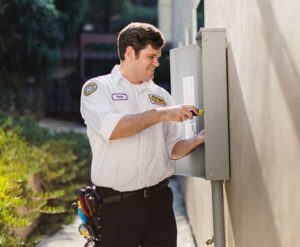
Common Reasons Why Your Generator Is Giving You the Silent Treatment
Have you ever tried to start your generator when the power unexpectedly goes out, only to be met with the hiss of silence and a machine that stubbornly refuses to cooperate?
It’s the homeowner’s horror story – a lifesaver that’s suddenly inoperable, leaving you with nothing but confusion and the dark. This post unearths the common reasons behind a generator that just won’t start, empowering you to troubleshoot like a pro.
The Power Panic
First on our list of Common Reasons why your generator isnt starting is battery condition . It’s 3 AM. The storm outside is roaring, and the lights have just flickered, dimming momentarily. A flash of panic sets in. “What if it all goes out?” you think. And then, it does.
The house is plunged into darkness, and you make a beeline for the generator, praying it’ll roar to life. But as your trembling finger pushes the start button, nothing happens. Here’s why:
Dead Battery Dilemma
The lifeblood of your generator’s start-up is often its battery, and much like the human heart, it can fail. Common reasons range from simple neglect – like the generator not being used or maintained regularly – to age or even a lack of the correct levels of electrolyte.
A simple voltmeter test could reveal if the battery is the source of your woes. If it reads below 12 volts, it’s time for a replacement or a recharge, stat. Remember, a generator should be tested monthly, not just when the storm clouds gather.
Untamed Tank Troubles
Stale fuel is the mortal enemy of engine start-up. If you’ve left your generator untouched for an extended period – particularly in the off-season – the old, oxidized gasoline can gum up the fuel lines and the carburetor, rendering them clogged and ineffective.
The fix here is straightforward but vital. Always use a fuel stabilizer in your generator if it’s going to sit idle for more than a couple of months. And if your generator falls victim to stale fuel, a carburetor cleaning and fresh replacement fuel are in order.
Persnickety Proximity
Generators are inherently temperamental about their environment. Conditions need to be just right for a successful start-up. Low oil levels and a missing fuel cap can lead to a lack of pressure for fuel and an unsafe engine shut-off, respectively.
Check both the oil and fuel caps – tighten the latter till it clicks and top off the former if you’re oil-sight glass isn’t showing the right level. These seemingly minor issues can make the difference between a generator that starts and one that doesn’t.
Sparking Awareness
When dealing with a generator that’s on strike, we often overlook the spark, both figuratively and literally. Electrical malfunctions and problems with circuitry can be at the heart of a generator’s refusal to start.
Wired for Troubles
Loose, disconnected, or corroded wiring can prevent the electrical current from reaching where it needs to be. A savvy homeowner should visually inspect the wiring, looking for signs of wear, corrosion, or clear signs of disconnection.
If the wires appear fine, the next step is to pull out a multimeter. Test for continuity to ensure the electricity is flowing as intended, and repair or replace the wires as necessary. Remember, it’s about the circuit, not the marathon when it comes to smooth generator operation.
The GFCI Gaffe
Generators equipped with Ground Fault Circuit Interrupters could fail to start if they’ve been tripped due to a ground fault. Pushing the ‘Reset’ button could be all it takes to get the power flowing again but be vigilant for ongoing issues.
If it keeps tripping, your generator is trying to tell you something. It could be damaged wiring, a ground fault, or even a problem with the GFCI itself. Whatever the cause, don’t push your luck. Investigate and resolve the problem to avoid starting issues in the future.
Finding Fuel Flow Problems
When generators sit idle, fuel and oil problems can brew over time, ready to boil over at the worst possible moment – like when you need it to save the day.
Culprits in the Carburetor
The carburetor can be a source of many issues, from improperly adjusted fuel mixtures to a dirty or misaligned float. Symptoms like rough running, hard starting, or failing to stay running without the choke are dead giveaways that the carburetor needs attention.
When your generator is being persnickety about starting, don’t forget the carburetor exists. A clean, well-maintained carburetor is like insurance against those anxious moments when you need reliable power the most.
Low Oil Levels
Adequate oil levels are the unsung hero of generator health. Low oil can cause the generator’s safety features to engage, preventing it from starting to protect against damage. Always check the oil before starting your generator and change it at the recommended intervals to ensure it’s clean and effective.
When your generator is whisper silent, it’s time to shout about the importance of proper maintenance. Starting issues are often symptoms of broader neglect, so keep an eye on the basics, and you might just prevent a breakdown entirely.
Have You Hit the Switch Right?
Believe it or not, user error is often one of the most common reasons behind a non-starting generator. Failing to follow proper start-up procedures or engaging in behavior that damages the machine can be at the heart of the issue.
Starter System Sensibility
Machines like generators are only as smart as the people who run them. The starter system in your generator can be a precise dance of buttons, chokes, and cranks. Fail to perform that dance correctly, and the machine just won’t start.
Review your generator’s start-up procedures in the manual; sometimes, it’s down to the timing and sequence of button presses and choke positioning. If all else fails, keep calm, read the instructions thoroughly, and try again.
Muffler Maladies
For many generators, a clogged muffler is the equivalent of a stuffy nose. An engine needs to breathe to start, and if the muffler is blocked, it can prevent the necessary airflow required to get everything going.
Check the muffler and exhaust system for any signs of blockage, which can include visible debris or even a backflow of exhaust from the engine. A clogged muffler is a simple but significant problem that can often be addressed by cleaning or replacing the unit.
Final Thoughts
In conclusion, a generator that refuses to start often hides a straightforward reason for its standoffish behavior. By approaching the troubleshooting task methodically, you can resolve most issues with a generator that is anything but ready in your hour of need. Understanding the common reasons why our equipment isn’t working is thee first step to solving the problem.
The power to avert these crises lies in regular maintenance, understanding your equipment, and responding thoughtfully in the moment. Remember, a powered home is a prepared home. Make sure you decode your generator’s silent protests so that when the lights go out, you’re ready to flip the switch on a quick and reliable power-up.
